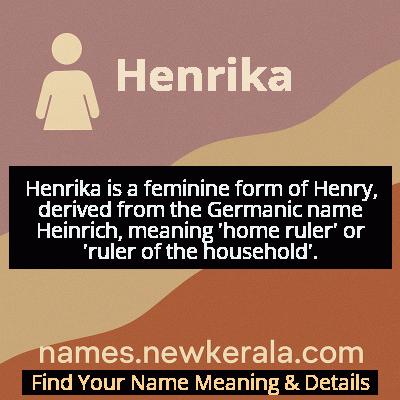Henrika Name Meaning & Details
Origin, Popularity, Numerology Analysis & Name Meaning of Henrika
Discover the origin, meaning, and cultural significance of the name HENRIKA. Delve into its historical roots and explore the lasting impact it has had on communities and traditions.
Name
Henrika
Gender
Female
Origin
Greek
Lucky Number
3
Meaning of the Name - Henrika
Henrika is a feminine form of Henry, derived from the Germanic name Heinrich, meaning 'home ruler' or 'ruler of the household'.
Henrika - Complete Numerology Analysis
Your Numerology Number
Based on Pythagorean Numerology System
Ruling Planet
Jupiter
Positive Nature
Optimistic, inspirational, and creative.
Negative Traits
Scattered, exaggerating.
Lucky Colours
Yellow, gold, purple.
Lucky Days
Thursday.
Lucky Stones
Yellow sapphire.
Harmony Numbers
1, 2, 9.
Best Suited Professions
Arts, writing, communication.
What People Like About You
Creativity, optimism.
Famous People Named Henrika
Henrika Šantel
Writer and poet
Pioneering female writer in Slovenian literature
Henrika Ringbom
Linguist
Significant contributions to Swedish language studies in Finland
Henrika Tandefelt
Noble and courtier
Cultural patronage and court service in 18th century Sweden
Henrika Katarina von Liewen
Countess and courtier
Political influence as lady-in-waiting to Queen Louisa Ulrika
Name Variations & International Equivalents
Click on blue names to explore their detailed meanings. Gray names with will be available soon.
Cultural & Historical Significance
Throughout European history, names derived from Henry/Henrik have been associated with rulership and authority, but the feminine forms like Henrika specifically came to represent matriarchal leadership within the home and community. In Scandinavian countries where the name is most prevalent, it carried connotations of capable household management and cultural preservation. During the 18th and 19th centuries, women named Henrika were often from educated, upper-class families where they exercised significant influence in maintaining family heritage, arranging marriages, and preserving cultural traditions. The name's persistence in royal and noble circles across Europe testifies to its association with dignified, traditional feminine authority rooted in domestic wisdom and cultural continuity.
Extended Personality Analysis
Women named Henrika typically exhibit strong organizational abilities and natural leadership qualities, particularly in domestic and family settings. They often possess a nurturing yet authoritative presence, creating warm, structured environments where others feel both cared for and guided. Their 'hearth mistress' quality manifests as exceptional hospitality, attention to detail in home management, and the ability to maintain family traditions while adapting to modern needs. Henrikas are often perceived as pillars of their communities—reliable, practical, and deeply connected to their roots.
These individuals tend to be traditional yet progressive, honoring time-tested values while embracing necessary change. Their strength lies in creating stability and continuity, making them excellent at preserving family heritage and cultural traditions across generations. Henrikas often demonstrate remarkable emotional intelligence, understanding family dynamics and knowing how to maintain harmony during challenging times. They're typically excellent listeners and mediators, using their understanding of human nature to resolve conflicts and strengthen relationships. While they may appear reserved initially, those who know them well appreciate their deep loyalty, sharp intuition, and the quiet strength they bring to every situation. Their leadership style is collaborative rather than authoritarian, making them effective in roles that require bringing people together around shared values and common goals.
Modern Usage & Popularity
In contemporary naming practices, Henrika maintains a niche presence primarily in Scandinavian countries, Germany, and among families with European heritage seeking to honor their roots. The name has experienced a modest revival in recent decades as part of the broader trend toward vintage and heritage names, though it remains considerably less common than variations like Henrietta or Harriet. In Sweden, the name appears occasionally in birth registries, typically among families valuing traditional Scandinavian names with historical depth. Modern parents choosing Henrika often appreciate its combination of classical elegance, strong feminine energy, and its symbolic connection to home and family values. The name's rarity adds to its appeal for those seeking distinctive yet traditional options. While not trending dramatically upward, Henrika maintains steady, low-level usage that suggests enduring appeal rather than fleeting popularity. Its strongest modern presence remains in Finland and Sweden, where it fits comfortably within naming traditions while offering a slightly unconventional choice compared to more common Scandinavian names like Ingrid or Astrid.
Symbolic & Spiritual Meanings
Symbolically, Henrika represents the sacred space of home and family—the 'hearth' as both literal and metaphorical center of life. The hearth in ancient traditions symbolized not just physical warmth and nourishment, but also spiritual light, family unity, and cultural continuity. As 'Mistress of the Hearth,' Henrika embodies the guardian of these values: the keeper of family stories, traditions, and the emotional heart of the home. This symbolism extends to concepts of stability, nurturing leadership, and the preservation of cultural heritage. The name suggests someone who creates sanctuary—a person who maintains the emotional and physical spaces where people can thrive, grow, and connect across generations. It represents the intersection of practical domestic management with spiritual guardianship, making it a powerful symbol of feminine strength rooted in creation and preservation rather than conquest. In psychological terms, the name evokes archetypes of the wise woman, the matriarch, and the cultural guardian—figures who maintain the fabric of society through their attention to relationships, traditions, and the spaces where human connection flourishes.

